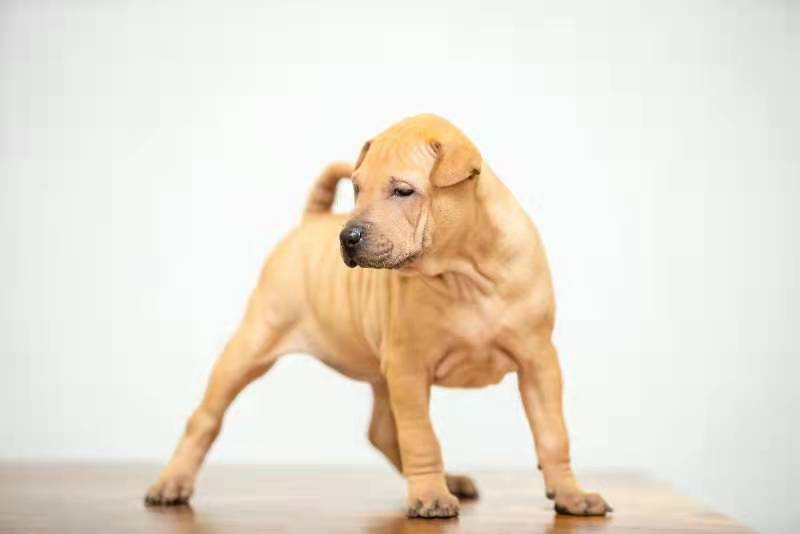Interview with Cao Yujian
Mr. Cao Yujian has been the chairman of the Dali Shar Pei Club in Foshan, Guangdong, China since 2018. Even though he is not a breeder himself, he has had close ties to the breed since childhood and has worked intensively to protect the original Shar Pei in China.
(translation from the Chinese original interview)
Can you tell us about your personal Shar Pei history? How and when did you come into contact with the breed?
In 1990 my family got an original (Bonemouth) Shar Pei. My father (Cao ChiHeng) was the first to get involved in veterinary medicine in Dali and founded the first veterinary clinic there. He was the first government-appointed head of this clinic. At that time, he basically only had an elementary school diploma, but he was very diligent, through self-study he passed the national uniform veterinary examination in 1987 and received the professional certificate as a veterinarian. At the time, Shar Pei breeding was heavily promoted by the local government and my father was one of those active promoters, so our family also has a unique relationship with the Shar Pei. The impact on our family was very far-reaching.
What do you like most about the Shar Pei?
I like the unique looks and temperament.
What do you think is the most important characteristic of the breed?
The appearance: He is very alert and seems a bit arrogant
The temperament: dignified and intelligent
The character: calm, watchful and loyal to the owner.
A unique breed that can be trained as a hunting and guard dog.
You are the President of the Dali Shar Pei Club. Can you tell us something about the history and goals of the club?
The Dali Shar Pei Club was officially established in the early 1990s. At that time it was called "Dali Shar Pei Dog Technology Research Association". In 1995, the first "Dali Shar Pei Cultural Festival and Shar Pei Dog Show" was held with the help of the local city government.
Many reforms and changed needs of dog owners have changed the animal market since the 1990s and the number of foreign dog breeds such as Poodles, Golden Retrievers and Pomeranians has increased significantly. From the 1990s, the number of Shar Pei continued to decline, reaching a low point in the early 2000s.
In 2018, after institutional reforms, I officially took over the presidency of the Dali Shar Pei Club. The club and its members have since been reorganized and restructured. We have started to revise the Dali Shar Pei standard. We organize and run the "Dali Shar Pei Cultural Festival and Shar Pei Dog Show".
Club members take their dogs to events such as dog shows and television appearances to promote the original breed's popularity. We also took part in a 50-kilometer non-profit hike in Foshan, which was very good for promoting the breed. The response from local people was very enthusiastic.
How many members does the Dali Shar Pei Club have and are they all Chinese citizens?
Currently the Dali Shar Pei Club has about 85 members. Most of them are Chinese nationals from China, Hong Kong and Macau. In addition, a German living in Switzerland.
Protecting and promoting the Shar Pei in China is very important for its future. What is the club doing about it?
In June 2019, the Dali Shar Pei Club, supported by the Dali City Culture Committee, applied for and successfully obtained the City Level Intangible Cultural Heritage Certificate for the Dali Shar Pei.
In 2022, the Dali Shar Pei Club is applying for the Geographical Indication "Dali Shar Pei Dog" as a registered trademark.
As President of the Association, I have also applied to the local authorities to build a Shar Pei Conservation Park.
Goals of such a Shar Pei Park:
- Conservation of the Dali Shar Pei in a protected area
- Promotion and popularity gain for the original Shar Pei
Elementary and middle school students can come to Shar Pei Dog Park. They will learn about the breed, its history and its cultural importance. In this way they can contribute to making the Dali Shar Pei better known and more popular.
What, in your opinion, is the biggest struggle for the breed in China at the moment?
The biggest problem of the Shar Pei in China is that there are not many people who breed and keep Shar Pei and the number of the original Shar Pei in China is only around 200 dogs. Compared to the current number of Chinese giant pandas, the number of the original Shar Pei is less than one-tenth that of the giant panda.
For the preservation of the traditional Dali (bone mouth) Shar Pei, the most important tasks are:
- Promotion and preservation of breeding and breeders
- Preservation and transfer of traditional knowledge
How do you feel when you compare the Shar Pei in China to the Shar Pei in the West?
Personally, when comparing Shar Pei from China to the rest of the world, I still like our Dali (bone mouth) Shar Pei the best.
A question I hear a lot in Europe: Why don't Chinese breeders work with CKU/FCI and register their dogs. Can you explain that?
Our club has no financial means to cooperate with the CKU/FCI. Income from our club is used exclusively to protect the breed and to support breeders and dog owners in need.
You have seen many Shar Pei in your life, what do you think is the overall quality of original Shar Pei in China?
The overall quality of the Chinese Shar Pei is gradually declining, largely due to the general circumstances of the breed in China. The original Dali Shar Pei is on the verge of extinction.
You have known the Shar Pei since you were a child. What has changed since then in terms of breeding in China?
Due to changing dog breeding regulations in the Pearl River Delta region, there are newer controls and restrictions on medium and large dog breeders. At present, the number of those who still breed original Shar Pei is small and continues to decline gradually. Many breeders are now too old. There are only one or two of the older breeders who continue because of their unique love for the breed. Mr. Huang Zhuhua is, in my opinion, the breeder who has done the most to protect the breed and is respected by all of us for that.
However, with continued evolving demand in the pet market, reforms and regional restrictions, plus limited kennel space, the conservation of the Dali Shar Pei continues to face major challenges.
When a young breeder asks you what they should pay most attention to when breeding Shar Pei, what do you answer?
The most important thing when breeding and raising a Shar Pei is that there is enough space. Space for daily dog training facilities. Subdivision options into activity areas, training areas, breeding areas, puppy areas, etc.
And to inspire some young people who love the original Shar Pei so that the Shar Pei cultural heritage can be passed on.
What are your hopes and wishes for the future of Shar Pei in China?
As President of the Dali Shar Pei Club, I will continue to uphold my original intention and work closely with the members of the club to protect and preserve the original Dali Shar Pei.
I also hope for further support from government agencies (construction of the Dali Shar Pei dog park). We want to work together to create a shining showpiece for Foshan with the original Dali Shar Pei.
Thank you Mr. Cao for this interview and thank you for allowing me to be a part of this process.









